Newsletter 2012 Volume 9 - Issue 1
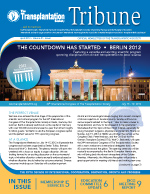
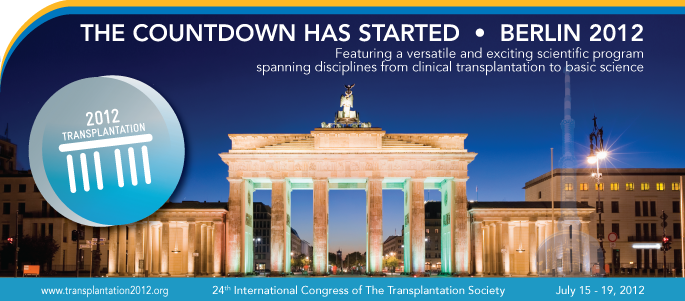
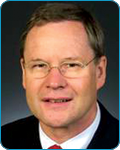
Peter Neuhaus
Congress Chair
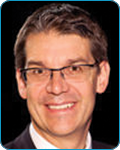
Wolf O. Bechstein
Congress Co-Chair
THE PERFECT VENUE
We have now entered the final stage of the preparation of the scientific and cultural program for the 24th International Congress of The Transplantation Society in Berlin, Germany this summer. Berlin is already well known as the capital of Germany with over 100,000 sociocultural events a year that attract roughly 9 million guests. Yet Berlin is also the European congress capital and the perfect venue for TTS’ upcoming congress.
AT A GLANCE
The Postgraduate Weekend on July 14-15, 2012 will precede the congress and has been organized by Stefan Tullius, Bernard Banas and Wolf O. Bechstein. The plenary session will open the weekend with a focus on equity in organ allocation. We are looking forward to an exciting discussion on the controversial topic of whether allocation criteria are really evidence-based or whether allocation should rather be outcome-oriented. Diverse concurrent workshops on Saturday will consider important clinical and immunological issues ranging from current concepts of chronic rejection to innate immunity. Sunday will focus on various aspects related to the topic: “How to make a career in transplantation and how to fund research in transplantation”. We believe that this topic will be of high interest, especially for young transplant surgeons, physicians and scientists. Finally, on Sunday, July 15, 2012 at 18:00, we will draw the curtain as the Congress Chair, Peter Neuhaus, and the Co-Chair for the German Transplant Society (DTG), Wolf O. Bechstein, will open the 24th International Congress of The Transplantation Society with a warm welcome to international delegates from over 60 countries around the globe. The opening ceremony will be musically accompanied by the Berlin Comedian Harmonists, who will bring back the vibrant atmosphere of the Golden Twenties. Afterwards, the Welcome Reception will provide a great opportunity for meeting old friends and making new ones.
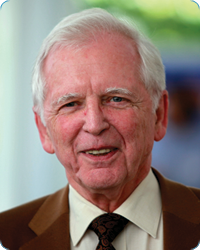
Harald zur Hausen
2008 Nobel Prize Laureate
in Physiology or Medicine
From Monday, July 16th to Thursday, July 19th, a versatile and exciting scientific program spanning disciplines from clinical transplantation to basic science will be presented by a large number of worldwide-established experts. We will have 26 Sunrise Symposia and 37 State-of-the-Art Symposia. Furthermore, extraordinary highlights will be presented in six plenary sessions. We are very fortunate to enlist outstanding international experts such as Peter Friend, who will speak on “Organ Scarcity: How Can We Meet Increasing Demands?” and Angus W. Thomson, who will introduce the work of the 2011 Nobel Prize Laureate Ralph Steinman. To highlight the “Progress and Challenges in Transplantation Surgery,” selected pioneers will present their insights on Thursday, July 19th. Hans Sollinger will focus on kidney and pancreas, Bruce A. Reitz on heart and lung, and Ron Busuttil on liver and intestine. The President’s Plenary on Wednesday, July 18th features the 2008 Nobel Prize Laureate Harald zur Hausen, with an outstanding presentation on oncogenic viruses.
Gerhard Opelz will give his presidential address prior to honouring the awardees of the Young Investigator Awards, Recognition Awards, TTS-Asturias Award for International Cooperation as well as the Medawar Prize. A special homage will also be paid to Leslie Baruch Brent.
The state-of-the-art sessions will give a comprehensive overview of contemporary transplantation medicine covering a wide range of topics from clinical issues such as intestinal or composite tissue transplantation to basic science topics like innate immunity or the role of microRNAs. Early risers will be rewarded with valuable Concurrent Sunrise Symposia. They will address important subjects from “New Targets for Immunomodulation” to different aspects of tolerance induction. Furthermore, ethical issues such as transplant tourism as well as innovations in intestinal and multivisceral transplantation will be discussed.
More than 2,000 submitted abstracts prepare the ground for approximately 50 concurrent oral sessions, 40 mini oral sessions and an extensive poster exhibition. All accepted posters will be printed on-site and displayed in traditional printed format. In addition, convenient poster lounges will provide electronic poster displays to promote a scientific exchange in a communicative atmosphere. The mini oral sessions will build bridges between conventional poster presentation and full oral presentations.
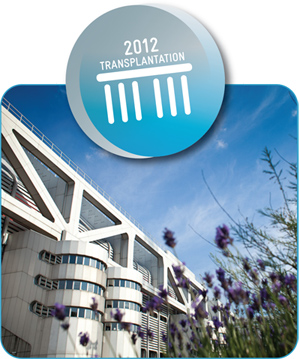 In addition to the scientific program, delegates will experience an exciting city with a wide range of cultural opportunities. As a gateway to Eastern Europe, the city offers almost innumerable cultural sights and a multitude of museums and theatres. To top everything off, after an exciting and interesting day at the congress, Berlin’s bars and nightclubs invite you to a relaxing evening.
In addition to the scientific program, delegates will experience an exciting city with a wide range of cultural opportunities. As a gateway to Eastern Europe, the city offers almost innumerable cultural sights and a multitude of museums and theatres. To top everything off, after an exciting and interesting day at the congress, Berlin’s bars and nightclubs invite you to a relaxing evening.
In case you have not submitted your abstract yet, there is an opportunity to do so during the Late Breaking Abstract Submission period from April 15 to May 7, 2012.
To stay up-to-date with information please visit our website at www.transplantation2012.org and join our mailing list or follow us on Twitter @TTS2012.
On behalf of The Transplantation Society and the Deutsche Transplantationsgesellschaft, we are delighted to welcome you to our colourful and cosmopolitan city and to the 24th International Congress!
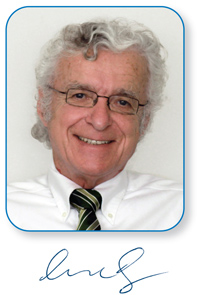
Gerhard Opelz
President
The 24th International Congress of The Transplantation Society in Berlin is coming closer by giant steps! July 15-19, 2012 are the dates to be marked in your calendar. As TTS President, I have the honour of officially opening the Congress at the Opening Ceremony and welcoming you all to Berlin. To date, well over 2,000 abstracts have already been received for review—with late breaking abstracts still to come. I look forward to meeting everyone at the 2012 Congress.
The Organizing Committee is doing an outstanding job and nearly all of the invited plenary speakers have already accepted—the list is impressive. For the next phase of congress preparation, over 200 experts in various subspecialties of transplantation have been enlisted to review and grade the abstracts in order to achieve the highest level of expertise and fairness. I am grateful to the many TTS members who have volunteered to serve as reviewers. Expert reviewing is a time consuming but necessary task, essential for composing an up-to-date and well-balanced congress program.
On-line congress registration is now possible at: transplantation2012.org/registration.php. Members will be pleased to see that all TTS members in good standing enjoy a substantial reduction in registration fees for the Berlin Congress. Considering the reduced fees they also enjoy when attending the TTS section congresses and meetings, TTS membership is not only professionally but also financially rewarding.
Those who are already established members are encouraged to ensure that the junior members in their departments are aware of the many benefits of membership. TTS would be proud to have them join us in representing the transplant field worldwide.
The year 2012 is an exciting year for TTS and its membership. Please join us at this year´s scientific and social highlight, the Berlin Congress on July 15-19, 2012.
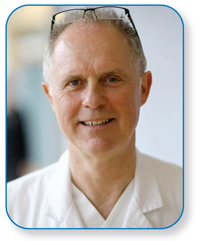
Henrik Ekberg
Don’t miss any of TTS’ upcoming
meetings, activities and initiatives in
2012 and 2013!
There are a great number of TTS activities going on at this time. I would like to take this opportunity to highlight some of them for you.
New Initiatives From the Education Committee
The TTS Education Committee (chaired by Marcelo Cantarovich and Elmi Muller) has been active recently with new ventures to increase members’ knowledge, find ways to share expertise, and increase impact in schools.
Monthly webinars continue to be organized on a variety of topics in the field of transplantation. You are invited to join us for the live presentation and discussion, or to view the recording at your leisure on www.tts.org. Try them out any time you have a spare moment to devote to your continued medical education.
We applaud the Education Committee’s most recent venture—a bi-weekly email update called “Do You Know?” that features commentaries on scientific articles of top interest, as well as announcements of upcoming webinars and other educational resources. Members are welcome to suggest articles and give comments.
Read more about the Education Committee’s initiatives on page six of this newsletter.
Successful 2011 Section Meetings
At the end of 2011, several TTS sections had meetings that were all successful and very well attended. In April, the International Hand and Composite Tissue Allotransplantation Society met in Atlanta. In June, the TTS Basic Science Committee held a joint symposium with ESOT in Cape Cod. In early September, the Transplant Infectious Disease section met in Glasgow and, in mid-September, the Intestinal Transplant Association members attended the XII International Small Bowel Transplant Symposium in Washington.
In October, the Cell Transplant Society and the International Xenotransplantation Association held a Joint International Congress in Miami, and in November the 11th International Society for Organ Donation and Procurement Congress attracted members and guests from all over the globe to Buenos Aires. These and the rest of TTS’ sections are already making plans for their next meetings, which will take place in 2013. Visit our website at www.tts.org for further information on all our meetings.
Declaration of Istanbul Custodian Group (DICG) Meeting in Buenos Aires
Since 2008, the DICG, co-chaired by Jeremy Chapman (TTS) and Adeera Levin (ISN), continues to promote and implement the Declaration of Istanbul. You can read more about their successful meeting in Buenos Aires in November 2011 on page nine of this newsletter, as well as follow ongoing updates, events and reports on their website, www.declarationofistanbul.org, edited by Gabriel Danovitch. Future efforts include an annual meeting, to take place alternate years at the TTS or ISN congress. This year’s meeting will be in Berlin in July at the TTS International Congress.
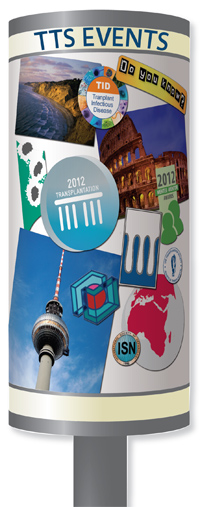
Highlights of 2012
For 2012, the highlight of the year is obviously the TTS International Congress in Berlin, but TTS will organize and support other meetings this year as well—the 3rd International Conference on Transplantomics and Biomarkers in Organ Transplantation in La Jolla, California that was held in March (chaired by Daniel R. Salomon), an Antibody Consensus Conference on solid phase antibody assays in Rome in May (chaired by Gerhard Opelz), the 6th International Transplant Infectious Disease Conference (chaired by Camille Kotton and co-chaired by Kaiser Laurent and Clarisse Martins Machado) to be held on July 15th in Berlin, and a CMV Consensus Meeting in September (co-chaired by Camille Kotton and Atul Humar) to update the current guidelines.
CTS Organ Transplant Registry Update
In the most recent issue of Tribune, we announced a new partnership between TTS and the Collaborative Transplant Study (CTS) organ transplant registry. Many transplant centres around the world do not have access to necessary software for documentation and analysis of their patient outcomes after transplantation. As a result of this partnership, all TTS members are offered a CTS software package specifically developed for transplant documentation and analysis at individual transplant centres. Many members have already contacted us, and we are currently working on finding suitable solutions for their needs. We are also grateful to those who have offered to provide data from their existing transplant databases to the international scientific registry. Specific information on how to contribute to the registry or obtain this software can be acquired by contacting the TTS Director of Headquarter Services at dhs@tts.org.
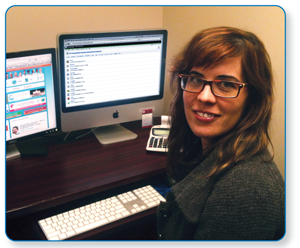
Alexandra Murphy,
Membership Services Coordinator
With over 5,000 TTS members and 1,000 section members, the Membership Services Coordinator plays a vital role in ensuring ongoing satisfaction with TTS services. Alexandra Murphy, our new Membership Services Coordinator since last August, has been working diligently with our technology group to improve processes to better serve our members. The sheer number of members, along with their geographic diversity and presence in multiple time zones, makes satisfying their need for information in a timely fashion a formidable task. While some members may only connect with Alexandra once a year when the annual invoices are sent, there are many other services she provides that you should be familiar with.
Alexandra’s relationship with members starts right from the day an individual applies for membership. It is her responsibility to guide the person’s application through the process of approval by the TTS Membership Committee, the different Section Presidents and of course, the TTS Councilors and Officers. Always on the lookout to improve procedures, she monitors the approval process and strives to reduce delay so the applicant can benefit from their association with TTS as soon as possible after applying.
TTS membership brings many benefits, not the least of which is access to a wealth of information on www.tts.org. Through the “Members Only” section of the website, you can update your contact info, access the membership directory, listen to webinars, watch multimedia presentations and much more. As the Membership Services Coordinator, Alexandra can help you derive the most from your online experience by pointing you in the right direction to find what you’re looking for.
Through the “Members Only” section of the website, you can update your contact info, access the membership directory, listen to webinars, watch multimedia presentations and much more.
One of Alexandra’s goals is to help grow membership exponentially in both the Society and in the Sections. As our membership becomes stronger and more diverse, more opportunities for teaching, learning and collaboration develop among our network of experts. One of the great advantages of being an international society is that TTS operates not only at the local or national levels but at the global level, where novel approaches and new research findings are more likely to emerge and initiatives in the field of transplantation can have a worldwide impact.
In addition to personal associations, TTS membership also provides you with structured opportunities for professional development. Getting involved in TTS activities such as webinars, committees and meetings means that you can learn from and collaborate with an international community of professionals who are experts in their fields. Many of these activities use technology to help bridge the geographical gaps between members and make connections possible via online platforms. These educational opportunities are not to be missed!
Finally, as a TTS member, you can take advantage of additional membership perks such as discounted rates for journal subscriptions, reduced congress registration fees, and eligibility for travel awards. Log into your TTS account and have a look at what is available to you. These savings are offered with you in mind!
Alexandra is always available to answer your questions and discuss your concerns. She can be reached directly at TTS International Headquarters via email: membership@tts.org or phone: 514-874-1717. Or when you come to the 2012 Congress in Berlin this summer, drop by the TTS booth and introduce yourself. Alexandra will be happy to assist you with whatever membership information you may require.
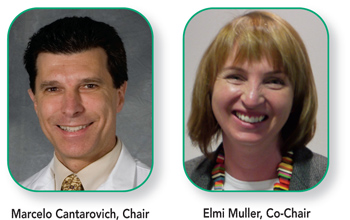 Do You Know?
Do You Know?
The Education Committee is very enthusiastic about our new educational activity called “Do You Know?”. The aim of this project is to broaden our members’ general knowledge by supplying a short summary of an article recently published in a peer reviewed journal. The commentary is published via email on a bi-weekly basis, and provides an easy read to the member, with the option of linking to the full article or any of the references on PubMed.
TTS Webinars
Webinars, a now very familiar and long-standing teaching tool, continue to attract many of our members. Each webinar features a 20-30 minute slide presentation followed by a question and answer discussion period. In the last year, several TTS members from different regions have been invited to chair webinars on a variety of topics, including: Transplant Infectious Disease (Jay Fishman, USA), Medication Adherence (Bethany Foster, Canada), HLA-Antibodies (Denis Glotz, France), and Non-invasive Biomarkers (Peter Nickerson, Canada). The online discussion format provides a lively and interactive space for participants. The webinars are also available as podcasts for members who were unable to participate in the live discussion.
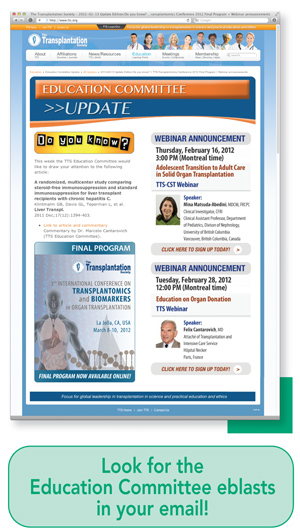
Online Patient Materials
The members of TTS Education Committee reviewed the currently available web-based information material addressed to patients. A selection of the most important websites has been selected and posted on TTS webpage.
EODTS Working Group and Forum
The Working Group on Education on Organ Donation and Transplantation for Schools (EODTS) has been created to bring together people from around the world who are involved with the education of school children in the field of organ donation and transplantation. This working group is open to all TTS members and non-members and its goal is to expand knowledge about organ donation and transplantation at school level worldwide. A 2nd EODTS Forum meeting will take place in Berlin on July 15, 2012, for members of the working group. Please visit the TTS webpage (www.tts.org) for more information.
Needs Assessment/ Gap Analysis Survey
A Needs Assessment/Gap Analysis survey is available for completion on TTS webpage at www.tts.org/educationsurvey. We encourage TTS members to complete the survey. This will help the TTS Education Committee address more educational needs in the future.
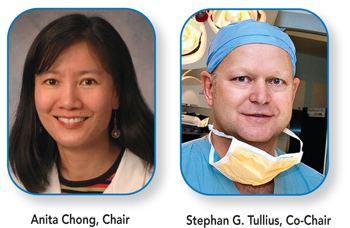 Discoveries in the basic sciences have been critical in moving the clinical practice of organ transplantation forward. Both clinicians/scientists and full-time basic researchers contribute in bringing transplantation to a new level. In the past two years, the Basic Science Committee, chaired by Anita Chong, University of Chicago and Stefan G. Tullius, Harvard Medical School, has focused on supporting young researchers and the relationship between mentor and mentee. At the 2012 Berlin Congress, TTS will present up to a total of 34 International Basic Science Mentee-Mentor Awards. TTS is extremely proud that 29 of these awards are in partnership with 8 societies: Australian/New Zealand (TSANZ), British (BTS), Canadian (CST), European (ESOT), French (SFT), German (DTG), and Japanese (JTS) transplantation societies. A total of 5 Mentee-Mentor Awards for applications from emerging economies will be supported solely by TTS.
Discoveries in the basic sciences have been critical in moving the clinical practice of organ transplantation forward. Both clinicians/scientists and full-time basic researchers contribute in bringing transplantation to a new level. In the past two years, the Basic Science Committee, chaired by Anita Chong, University of Chicago and Stefan G. Tullius, Harvard Medical School, has focused on supporting young researchers and the relationship between mentor and mentee. At the 2012 Berlin Congress, TTS will present up to a total of 34 International Basic Science Mentee-Mentor Awards. TTS is extremely proud that 29 of these awards are in partnership with 8 societies: Australian/New Zealand (TSANZ), British (BTS), Canadian (CST), European (ESOT), French (SFT), German (DTG), and Japanese (JTS) transplantation societies. A total of 5 Mentee-Mentor Awards for applications from emerging economies will be supported solely by TTS.
The Basic Science Committee recently received applications for a brand-new TTS International Basic Science Research Exchange Fellowship program (application submission closed on April 1st). Two series of five research fellowships will support established investigators and trainees, respectively, to travel from their host institutions to another laboratory for 3, 6 or 12 months to develop new research collaborations/directions or technologies. Award winners will be announced at the 2012 Berlin Congress in July.
The Berlin Congress has a lot to offer—the Mentee-Mentor and Research awards are only a few of the attractions designed specifically for basic scientists. Awards will be presented at the networking event hosted by the TTS Basic Science Committee and co-sponsored by the German Transplantation Society. Please be on the lookout for details and plan to come to congratulate winners, meet up with old friends and colleagues and make new ones. We are looking forward to seeing you in Berlin!
 |
 |
 |
 |
 |
 |
 |
 |
The Women in Transplantation (WIT) group is proud to share with our members our upcoming events for 2012. Over the last few years, many women have had the opportunity to attend one of our WIT networking events, which are linked to international congresses in the field of transplantation. These events give professional women the opportunity to get to know each other better and have been the start of many new friendships. The next networking event will take place in Berlin on July 16, 2012 and features a lunch and a talk by Dr. Elmi Muller from South Africa. She will ask the question: “Do you treat Rottweilers or Poodles?” to inspire her audience to reflect on women’s roles in medicine and transplantation and how we are different from our male colleagues. The next morning, conversation will continue in this field with speakers Prof. Regine Rapp-Engels from Germany, Dr. Beatriz Dominguez-Gil from Spain and Prof. Del Kahn from South Africa at an early morning symposium. Feminization in medicine as a general trend and the implications for the workplace will be discussed—we hope to see some of our male colleagues at this session as well. The WIT group is one of the fastest growing groups in TTS and it attracts more and more people every year. Our recently started mentorship programme will also provide some opportunities to younger clinicians and scientists to obtain input into their careers and the choices they make. We hope to include abstracts from mentors and mentees at TTS’ International Congress in Berlin in July as well.


DICG members met in Buenos Aires to discuss DOI progress and future plans.
The Declaration of Istanbul (DOI) has been adopted and endorsed all over the world—more than 110 organisations have examined the declaration and decided that it meets their needs to assist in the appropriate protection of living donors and the enhancement of transplantation activity.
To ensure that the DOI principles become realities in practice, the DOI is supported by working groups of committed individuals, organized under the umbrella of the Declaration of Istanbul Custodian Group (DICG). In practical terms, the working groups oversee a series of important activities that uphold the DOI principles. This means that referees consider the principles of the DOI in their assessment of papers submitted to journals on a transplantation subject, grant funding agencies consider the origin of organs when assessing for funding, pharmaceutical companies ensure that the clinical research programs they contract or support do not abuse the living donors, institutional review boards have guidelines to which they may turn when considering a specialist transplantation protocol, and organizers of meetings ensure that all presenters uphold the principles of DOI. These activities do not happen in these various environments automatically, or simply, or quickly. There is much work to be done to sustain the efforts: the Declaration of Istanbul Custodian Group is putting in the effort.
The DICG met in November 2011 in Buenos Aires, just before the International Society of Organ Donation and Procurement congress. The group discussed the progress of the DOI over the past year and concentrated on each of the working groups’ plans for the next year. As examples of planned activities, we are hoping to encourage more journal editors to take up the DOI overtly in their author instructions and advice to referees. This would help to establish more regular reporting of activities that support the DOI by national organizations, and to develop methods by which to overtly document the outcomes of both best and poor practices in different regions. Working with the infrastructures of The Transplantation Society (TTS) and the International Society of Nephrology (ISN), the DICG continues its work to improve global practices in transplantation. Ultimately, our intention is to provide a handbook of the DOI for people in different environments and different professions so that those formal groups or societies that have endorsed the DOI can have a simple guide and set of tools to help them implement specific activities. Through sharing what others have implemented successfully, we hope to impact practices in a sustainable way. Watch this space for further news of our progress.

 |
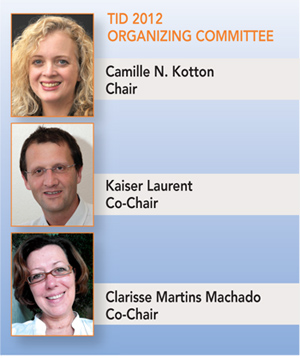
The Transplant Infectious Disease section had an exciting meeting in Glasgow, Scotland in September, with world-class speakers and excellent updates in the field. These lectures can be viewed by TID and TTS members online for free at www.tid2011.org. We will have another similar meeting on Sunday, July 15, 2012 in Berlin, just before the start of the 24th International Congress of The Transplantation Society. All TTS members are encouraged to attend this stimulating and clinically relevant meeting. Our section has undertaken an initiative for infectious disease guidelines for composite tissue transplantation. In addition, we will be updating the widely used international guidelines regarding cytomegalovirus management after organ transplantation, initially published by our group in 2010. We would warmly welcome new members, especially those with fresh ideas regarding transplant infectious disease issues.
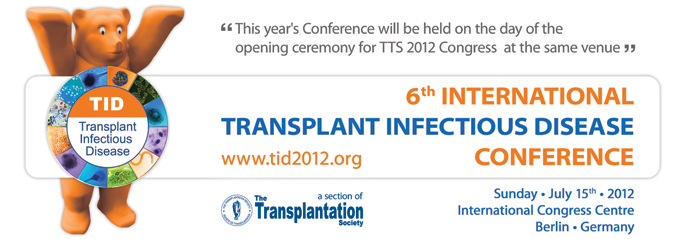
 |
The Intestinal Transplant Association (ITA) has been an official section of TTS for nearly a decade. It was created in 2003 at the VIII International Small Bowel Transplant Symposium in Miami, Florida, reflecting the joint vision that the late Professor Richard Wood (England) and Kareem Abu-Elmagd (USA) shared in 1999 at the VI Symposium in Omaha, Nebraska. The association was established as a formalized and unified group of professionals with a common interest in gut failure, rehabilitation, and transplantation.
Since the first meeting held in London in 1989, there have been twelve biannual International Small Bowel Transplant Symposia, alternating locations between Europe and United States. The most recent successful reunion in Washington, DC in September 2011 was a testimony of the association’s vital role in the field of clinical and academic evolution. The meeting witnessed advances in mucosal immunology, tissue engineering, gut rehabilitation, and visceral transplantation. Awards were given to young investigators with outstanding experimental and clinical work.
With the establishment of global leadership in gastrointestinal rehabilitation and transplantation, the association’s mission is to continue to save and enhance the lives of gut failure patients with novel medical and innovative surgical management, including reconstructive and transplant surgery. ITA’s current goals are to further enhance communication and organizational effectiveness, create a community of practice, facilitate research, and increase membership.
Our next meeting, the 13th International Small Bowel Transplant Symposium chaired by Prof. Peter Friend, will be held in Oxford, UK in June 2013. Stay tuned for more information coming soon.
 |
In Cell Transplantation Society news, the national Phenylketonuria Alliance just issued a bulletin to all of its members, and is posting on its website a message announcing that at the University of Pittsburgh, a clinical trial of hepatocyte transplantation to treat PKU in adult patients has become active and patients are being recruited for consideration. Writing on behalf of its members, Christine Brown, Executive Director of the National PKU Alliance, issued this statement:
The National PKU Alliance commends the researchers at the University of Pittsburgh Medical Center on the opening of their clinical trial of hepatocyte liver cell transplantation for the treatment of PKU adults. The NPKUA supports hepatocyte transplantation research in PKU mice through the funding of two University of Pittsburgh fellows, Dr. Kristen Skvorak-Vallieu and Dr. Roberto Gramignoli. Encouraging results have been found with hepatocyte transplantation when used in PKU mice and in other inborn errors of metabolism diseases. This will be the first time hepatocyte transplantation will be used in PKU adults. The NPKUA is excited about the advances the new clinical trial will bring. To learn more about the hepatocyte transplantation clinical trial, please visit the National Institute of Health clinical trial website.
The latest information on hepatocyte liver cell transplantation will be presented at our 2012 National Conference held July 26-29, 2012 at the Crowne Plaza Hotel in Cherry Hill, NJ. Please watch for upcoming announcements about registration, as you will not want to miss learning the latest on this amazing research. We hope you join us in Making PKU History!
 |
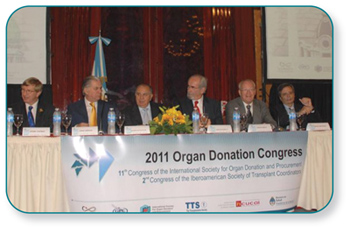
The ISODP 2011 Congress was an excellent opportunity to
discuss ideas and exchange knowledge.
The ISODP Congress in Buenos Aires in November 2011 was a big success—949 professionals participated, with more than 74% from Argentina and South America. The congress offered an opportunity for extensive exchange of knowledge against an excellent scientific background spanning the entire fields of organ donation, organ procurement and donor management. Of course, it gave the opportunity for a lot of discussion among specialists to learn from each other and compare their methods. Dr. Carlos Soratti and his colleagues are congratulated for their work and organisation that made this event possible, especially in a time of tight financial resources. During the conference, the ISODP members decided that the next meetings will take place in Sydney, Australia in 2013 and in Seoul, Korea in 2015.
Today, further development of organ donation is considered an absolute requirement. In the field of transplantation, better distribution of knowledge on how to detect donors in donor management, improvements in family approach and family care, and an increased number of investigations are all greatly needed. At the recent congress, new techniques for organ preservation, including cold or warm machine perfusion were discussed, together with aspects of safety and measures in the whole field of organ and tissue donation. Interest in this field is rapidly increasing due to the worldwide spread of as yet unknown infectious and other diseases. Future challenges include both providing enough high-quality organs as well as performing further investigations concerning safety issues. Participants of the Buenos Aires meeting took home state-of-the-art knowledge in this field. Altogether, the meeting was impressive and a great success.
 |
The Council of the International Xenotransplantation Association (IXA) greatly appreciates the leadership of its Immediate Past President, Dr. Emanuele Cozzi, and the important contributions of Dr. David Sachs, Dr. Pierre Gianello, and Dr. Takaaki Kobayashi, who served as Councilors through 2011.
Dr. Bernhard Hering, President, and Dr. Peter Cowan, Secretary and Treasurer, will work with Dr. Takaaki Kobayashi, President-Elect; Dr. Emanuele Cozzi, Immediate Past President; and Council members (Drs. Agnes Azimzadeh, Gina Rayat, Gilles Blancho, Leo Buhler, Chung-Gyu Park, and Kazahiko Yamada) to advance i) planning for the 2013 IXA meeting in Osaka, Japan, ii) communications, iii) education, iv) membership, and v) regulatory matters pertinent to xenotransplantation. Dr. Richard Pierson III, Past President of IXA, has been appointed Chair of the Ethics Committee of IXA and ex-officio non-voting member of the IXA Council; he will replace Dr. Anthony d’Apice. The IXA Council acknowledges the important contributions of Dr. d’Apice.
IXA and the journal Xenotransplantation have jointly established a new annual Xeno Prize to be awarded, beginning in 2012, to the author of the best original paper published in the relevant year in Xenotransplantation. The Xeno Prize Committee will select the awardee from a list of candidates recommended by the journal’s Associate Editors.
Dr. Leo H. Buhler has been named the new Editor-in Chief of Xenotransplantation, the official journal of IXA. He took over from Dr. Carl-Gustav Groth, who edited Xenotransplantation from 2008 to 2011. The IXA council is profoundly grateful for Dr. Groth’s exemplary leadership and achievements.
IXA would like to refer readers to its website at www.tts.org/ixa for further updates.
Contact
Address
The Transplantation Society
International Headquarters
740 Notre-Dame Ouest
Suite 1245
Montréal, QC, H3C 3X6
Canada
Используйте Вавада казино для игры с бонусом — активируйте промокод и начните выигрывать уже сегодня!

